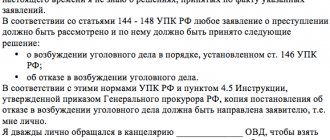Patients often criticize the work of doctors and, in particular, ambulances. According to the patient, he should be hospitalized, but the emergency doctor refuses to do so. Is such a refusal a violation of the law? Can hospitalization be refused at all and on what grounds? This topic is especially relevant now, in the midst of the coronavirus epidemic, when refusal to timely hospitalization can be fraught with complications of the disease. Let's consider the legislative aspects of the actions of the ambulance team in this situation.
Does the ambulance have the right to refuse hospitalization?
Refusal to provide medical care is qualified by Russian legislation as a criminal offense. For refusal to provide medical assistance, the perpetrators will be held accountable under Article 124 of the Criminal Code of the Russian Federation, and for leaving in danger under Article 125 of the Criminal Code of the Russian Federation. Under these articles, it is possible to impose a fine, compulsory, corrective or forced labor, as well as imprisonment.
However, the ambulance has the right to refuse hospitalization if an examination of the patient shows that there are no grounds for this. But if the patient gets worse and he calls an ambulance again, then he must be hospitalized in any case.
If they refuse to be hospitalized, the patient can call the dispatcher and state that he feels bad and that he was denied hospitalization, although he agreed to it.
In a situation where the dispatcher refuses to accept a repeat call, you must contact the hotline of the regional Ministry of Health. The telephone numbers of such hotlines can be found on the Ministry of Health website. In the current epidemic situation, it is worth prescribing them in advance in case symptoms of coronavirus appear and the need to urgently seek help.
It is also necessary to understand the fact that the lack of documents is not a basis for refusal to provide medical care. They are obliged to help a person on a general basis, even if he does not have documents.
Legislation
There are a number of legal acts that regulate the rights of citizens to receive medical care and protect them from unlawful refusals by medical workers. These acts include:
- “Law on the Protection of Citizens’ Health” No. 323 of 2011. This law lists all the responsibilities of paramedics and doctors when patients contact them.
- “Law on Compulsory Insurance” No. 326 of 2010. According to insurance legislation, all insurance holders must receive the medical care they need on the territory of the Russian Federation.
- The Criminal Code of the Russian Federation defines punishment for refusal to provide assistance or negligent attitude towards a patient.
- Government Decree No. 1492 of 2021, which guarantees the provision of medical care free of charge.
- Orders of the Ministry of Health No. 445/77 and No. 388n determine the operating procedures of medical institutions.
All emergency services, including ambulance, can now be called via a single number, 112.
Is it legal to require the refusal to be put in writing?
Doctors do not have the right to refuse hospitalization to a person whose condition is the basis for providing such assistance. If, after refusing hospitalization, the patient’s condition worsens or he dies, the doctors will be punished under criminal law.
If the patient himself refuses to undergo hospitalization, even though there are grounds for this, doctors are obliged to explain to him the possible consequences. If he still refuses, then the emergency doctors should ask him to write a refusal. This document is necessary so that problems do not arise if the patient’s condition worsens, and doctors are then not accused of refusing to provide assistance to him.
The written refusal indicates the fact that the patient was informed about the possible consequences of refusing hospitalization, and that the patient takes responsibility for such consequences.
If the hospital refuses help
Or they do not directly refuse, but health workers do not take measures to clarify the diagnosis and treatment. What to do in this case?
The first piece of advice is not of a legal nature: first, make sure that the issue cannot be resolved by talking on the spot. Remember, the staff of the institution where the patient was brought is obliged to provide assistance to him as long as the threat to life and health remains.
As a rule, you can get through with simple human conversation, especially if you put yourself in the doctors’ shoes. It didn’t work out - you need to move on and solve the problem, for example, with the head physician. Very often, questions that arise at the level of line personnel magically disappear; it is worth contacting someone from the management team.
If negotiations do not help, take the situation to the legal plane, but remember that you need to be on your guard. My personal experience shows: when it seems that the situation is critical, it is better to accompany the patient everywhere and control what is happening as much as possible. Doctors are doctors, but don’t forget about the human factor, when someone forgot something, overlooked something, missed something - and time was lost.
Consequences for the doctor and the hospital
For refusal to provide assistance, liability is provided for both specific employees of the medical institution and the institution itself.
The dispatcher is obliged to accept the call and send an ambulance. If he refuses to allow her to leave, he will be prosecuted.
If the hospital registry refuses, a fine will be imposed on the hospital, and the doctor who refused assistance will be subject to disciplinary action if his refusal did not entail serious consequences for the patient’s health. If the patient died, the doctor’s actions will be checked by the prosecutor’s office and a criminal case will be opened for negligence, which resulted in the death of a person. For this he may be imprisoned.
Have a question for a lawyer? Ask now, call and get a free consultation from leading lawyers in your city. We will answer your questions quickly and try to help with your specific case.
Telephone in Moscow and the Moscow region: +7
Phone in St. Petersburg and Leningrad region: +7
Free hotline throughout Russia: 8 (800) 301-39-20
Where to go if hospitalization is refused
Refusal to hospitalize is the basis for applying:
- To the dispatcher (to call the ambulance again).
- To the hotline of the regional Ministry of Health.
- Contact the head physician of the hospital if you are refused a personal visit to the hospital.
The reason for refusal may be the lack of space in the hospital. In this case, the ambulance must transport the patient to another hospital.
The patient also has the right to contact the insurance company based on the policy or call Roszdravnadzor.
How is hospitalization carried out?
The decision regarding hospitalization of the patient is made by the doctor after an examination. According to the law “On the fundamentals of protecting the health of citizens in the Russian Federation,” hospitalization is mandatory when:
- life-threatening condition;
- childbirth;
- postpartum period;
- injuries received as a result of emergencies and natural disasters.
The patient is taken to the emergency room of the hospital, which is located closer to his place of residence. However, the diagnosis given to the patient and the profile of the medical institution are taken into account. As a rule, wishes expressed by the patient or his relatives regarding the hospital cannot be taken into account.
If the patient lives in a populated area, the place where he will be delivered depends on the diagnosis. They can take you to the local hospital. Calling an ambulance and hospitalization are not paid for by the patient, that is, they are carried out free of charge.
If a situation arises when the ambulance refuses hospitalization or it is not possible to call a team, then the patient has the right to go to the emergency department of the hospital of his choice.
Attention! The presence of registration at the place of residence does not matter for the provision of medical care. Even a foreigner can go to the hospital or call an ambulance.
If the situation in which the doctor decides to hospitalize is not an emergency, then the patient can write a refusal. The refusal is made in writing. When the patient is a minor child or a person deprived of legal capacity, the refusal is drawn up by his legal representative. If the doctor considers that the decision to refuse hospitalization jeopardizes the life and health of the patient, the medical organization will appeal to the guardianship authorities or the court. Also, the senior ambulance crew member is authorized to call the police.
When a person is deprived of legal capacity and is unconscious, relatives cannot prevent his hospitalization. Medical intervention without the consent of a person or his legal representative is permissible:
- if such intervention is required for emergency reasons in order to eliminate the existing threat to life or health;
- when a person’s condition does not allow him to express his will, and he does not have legal representatives;
- if the person suffers from a disease that is dangerous to others;
- if the person has a mental disorder that occurs in a severe stage;
- if the person has committed a crime;
- during a forensic psychiatric or forensic medical examination.
Download for viewing and printing:
Federal Law of November 21, 2011 No. 323-FZ “On the fundamentals of protecting the health of citizens in the Russian Federation”
Patient's actions in case of refusal
A refusal to provide assistance, including necessary hospitalization, must be appealed.
A doctor’s refusal to admit a patient is grounds for filing a complaint with the head physician. The complaint must be made in writing in two copies. The text must describe the situation that occurred, as well as exactly what rights were violated.
The petition part indicates a request to provide assistance and punish the doctor who refused it.
The complaint is submitted to the secretary of the chief physician. The secretary must mark receipt on the complainant's copy.
In case of a complaint against a hospital, you must contact Roszdravnadzor, health insurance funds and the Ministry of Health.
In some situations, such a complaint can be filed with the police or prosecutor's office. This is possible if the refusal to provide assistance led to a serious deterioration in health, which required amputation of limbs, other surgery, or led to the death of the patient.
In case of extortion of a bribe for hospitalization, you should also contact the prosecutor's office.
Material damage resulting from the hospital's actions must be compensated in court. The claim specifies the details of the hospital, the guilty employees, the victim, as well as all the circumstances of the case and supporting documents.
Refusal of hospitalization and surgical intervention
Legislative norms provide for a person’s right from surgical intervention. The patient also has the opportunity to demand that the intervention be stopped. When a person refuses, the hospital medical staff must explain to him what the consequences will be. In case of refusal, a representative of the institution makes a note about this in the medical reporting documents. The completed application for refusal is signed by the applicant. It must also be signed by the doctor who provided assistance or performed the operation. If the refusal is made for a child who has not reached the age of majority or a person declared incompetent by the court, it can be refuted by a representative of the medical organization. To do this, they need to contact a judicial authority. In such cases, medical workers direct all their efforts to save the lives of these individuals. A protest is possible when specialists see a real threat to a person’s life.
The law provides for cases where medical care may be provided without obtaining the patient’s consent.
Such assistance includes:
- observation;
- examination;
- insulation;
- hospitalization.
A medical professional can perform all these actions in the following cases:
- the presence of a disease that poses a threat to the surrounding society;
- presence of a mental disorder;
- committing actions that are illegal and dangerous.
To perform these actions, you must obtain a court decision. It must make a decision to provide assistance despite the lack of patient consent. When it is necessary to take measures against epidemics, you need to base your actions on sanitary standards of laws. If a person suffers from mental disorders, he can be helped without obtaining permission, acting within the rules of the law that regulates mental health care. The patient must remain on the territory of the medical institution until the grounds disappear. Also, the stay can be ended by decision of a judicial authority.
Liability under the Criminal Code of the Russian Federation
For failure to provide assistance, which led to harm to health of moderate severity, the following sanctions are provided under Article 124 of the Criminal Code of the Russian Federation:
- Fine up to 40 thousand rubles (salaries up to 3 months).
- Compulsory work for 360 hours.
- Correctional labor for up to a year.
- Arrest for up to six months.
If the actions (inaction) of a doctor lead to serious harm to the patient’s health, he will be punished with forced labor or imprisonment for up to 4 years. Additionally, they may be prohibited from holding positions and conducting certain activities for up to 3 years.
According to Article 125 of the Criminal Code, for leaving a person in danger who cannot help himself, punishment is provided in the form of:
- Fine up to 80 thousand rubles (salary for six months).
- Compulsory work for 360 hours.
- Correctional labor for up to a year.
- Forced labor for up to a year.
- Arrest up to 3 months.
- Imprisonment for a year.
In the context of the coronavirus epidemic, refusal to hospitalize is often associated with a discrepancy between the patient’s symptoms and those typical for the virus. But only a special test can give an accurate answer to the question of the presence of infection. And if a virus is suspected, the patient is required to provide assistance, including hospitalizing him and conducting the necessary research. Therefore, refusal to provide such assistance is grounds for holding medical workers accountable.
When an ambulance does not respond to a call
For almost all calls, the ambulance goes to the patient’s location. At the same time, there are cases when the team may not respond to requests received.
Such situations include:
- Call for blood pressure measurement or other minor treatment.
- Call due to exacerbation of a chronic disease. This applies to such an exacerbation in which there is no danger to human life.
- Addressing issues that are not included in the list of specialists’ powers.
Ambulance personnel are not required to carry out the process of determining the extent of alcohol and drug use.
In addition, their responsibilities do not include:
- issuance of certificates;
- dental assistance;
- hangover relief;
- prescription of a treatment course.
If a person needs long-term help, he needs to go to a hospital for treatment.










